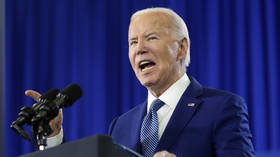Chelsea Manning’s mail censored over ‘US copyright law,’ EFF cries foul

The US military prison has blocked delivery of printed articles on prison censorship to jailed whistleblower Chelsea Manning, citing copyright laws. The Electronic Frontier Foundation, which sent the articles, suspects something else was behind the ban.
The American digital rights group sent printouts of six articles – four of its own and another two by Buzzfeed and Harvard Business Review – addressed to Manning, who is serving a 35-year term at the US Disciplinary Barracks (USDB) at Fort Leavenworth, Kansas.
However, Manning was denied the delivery because the package contained “printed Internet materials, including email, of a volume exceeding five pages per day or the distribution of which may violate US copyright laws,” the military prison’s staff said in a notification to the WikiLeaks whistleblower.
The EFF’s Dave Maass said he suspected that the USBD’s staff was not genuine in its reasoning.
“It is possible that the Army withheld the documents because they were longer than five pages. However, we believe this to be unlikely since the documents it did deliver were far longer than any of the other materials and exceeded five pages,” he wrote in a post on the EFF website.
Manning did receive a 65-page handbook titled 'Inmate Admission and Orientation' and the Bureau of Prisons’ eight-page guidebook on 'Combating Inmate Facebook Usage.'
“That means that it was potentially copyright concerns that resulted in Manning’s mail being censored,” Maass wrote.
On February 11, EFF Executive Director Cindy Cohn wrote to the commandant of the USDB, explaining that not only did the group grants permission for Manning to receive its materials, but that all of its articles are published under a Creative Commons license and are available for reuse.
The EFF requested a response by February 18, but had received no reply from the Army as of February 22.
“Manning has also not received the documents. We have since put the documents in the mail ourselves,” Maass wrote. “We hope that the Army made a mistake and does not have a policy of misusing copyright to deny prisoners access to important materials that the general public can freely access.”
Stressing the EFF’s copyright holder status, Maass has called the USDB on behalf of the group to provide Manning with the documents immediately and not to block any further EFF material from the facility.
“Prisoners like Manning who want to stay up on events that can directly impact them and others should be supported, not prevented, from accessing information,” he wrote, stressing that “prisoners do not lose all rights when they step behind bars.”
Chelsea Manning avoids indefinite solitary confinement http://t.co/9AylwKfrwspic.twitter.com/tUhryk5uO0
— RT (@RT_com) August 20, 2015
Private Bradley Manning was serving in the US Army in Iraq in 2009 as a military analyst. Troubled by the actions of US forces and their allies, Manning leaked 750,000 classified US military files to WikiLeaks. The leak led to his arrest and conviction.
Following the verdict, Manning came out as a transgender woman, changed her name to Chelsea, and won the right to receive taxpayer-funded hormone replacement therapy. However, the Army does not recognize Manning as a woman.













